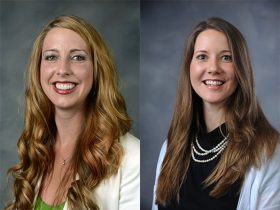The Communications professors participated in a panel discussion and poster session.

Elon University School of Communications associate professor Julie Lellis and assistant professor Lucinda Austin participated on a panel and presented a poster at the Public Relations Society of America conference Oct. 11.
Their presentations were in the Educators Academy division of PRSA.
The panel presentation was titled “Teaching Digital Media Writing: Challenges, Opportunities, and Examples for Public Relations Education.” Representatives from the University of Oregon and the University of Tennessee joined Lellis and Austin on the panel.
The abstract for the panel reads: “Strategic writing for forms of digital media is cursorily addressed in public relations textbooks, although students are increasingly expected to enter the workforce with knowledge of how to write professionally for these platforms with limited expertise. As public relations teachers work to keep classroom content up-to-date in this converged media climate, guidance on teaching writing has become increasingly important. This panel brings together teachers and scholars to address integration of strategic writing for digital media into public relations classrooms. Panelists will discuss evidence (or lack thereof) of best practices in writing for these forms of media, challenges and opportunities for integrating digital media writing into the classroom, and examples of innovative teaching methods and materials.”
Lellis and Austin’s poster presentation was titled “Enhancing Pedagogical Tools in the Public Relations Writing Course: Reflecting on the Importance of Writing Enjoyment, Confidence, and Achievement.”
The abstract for the research reads: “To further build upon public relations pedagogy and pedagogical tools—often cited as sparse and weak, particularly in the area of writing—this project enhanced and piloted strategic writing assignments including a journal/learning log, social media exercise, group pitch, and others. Students completed initial and follow-up writing assessments, reflected through journaling and learning logs throughout the semester, and participated in focus groups. Findings revealed students’ confidence in their writing abilities improved significantly over the course of the semester. Students had the most confidence in their writing ability and highest grade attainment for the assignments they also reported enjoying more; this finding ties to previous research suggesting enjoyment leads to self-efficacy in writing and writing attainment and achievement.”
The research for Lellis and Austin’s poster was funded by a grant from Elon’s Writing Excellence Initiative.


